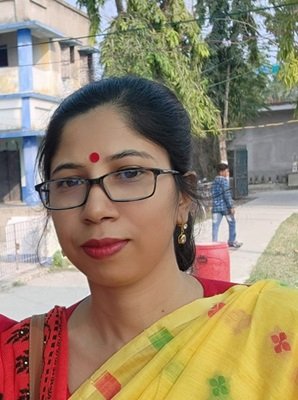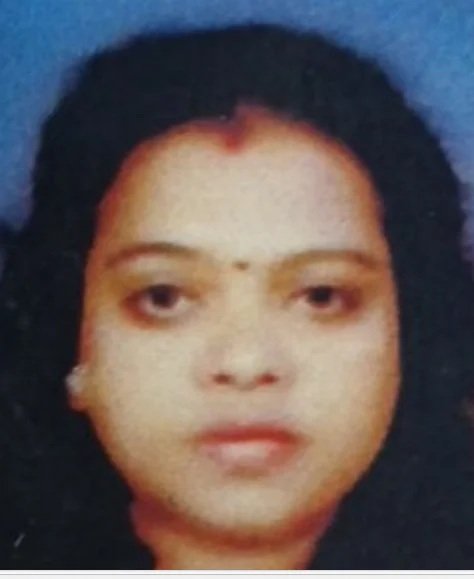 “হেমন্তের ঝড়ে আমি ঝরিব যখন পথের পাতার মতো তুমিও তখন আমার বুকের ’পরে শুয়ে রবে? অনেক ঘুমের ঘোরে ভরিবে কি মন সেদিন তোমার। তোমার আকাশ—আলো—জীবনের ধার ক্ষ’য়ে যাবে সেদিন সকল? আমার বুকের ’পরে সেই রাতে জমেছে যে শিশিরের জল তুমিও কি চেয়েছিলে শুধু তাই, শুধু তার স্বাদ তোমারে কি শান্তি দেবে। আমি চ’লে যাবো—তবু জীবন অগাধ”
“হেমন্তের ঝড়ে আমি ঝরিব যখন পথের পাতার মতো তুমিও তখন আমার বুকের ’পরে শুয়ে রবে? অনেক ঘুমের ঘোরে ভরিবে কি মন সেদিন তোমার। তোমার আকাশ—আলো—জীবনের ধার ক্ষ’য়ে যাবে সেদিন সকল? আমার বুকের ’পরে সেই রাতে জমেছে যে শিশিরের জল তুমিও কি চেয়েছিলে শুধু তাই, শুধু তার স্বাদ তোমারে কি শান্তি দেবে। আমি চ’লে যাবো—তবু জীবন অগাধ”
The department of Bengali of Domkal Girls' College was established in 07.07. 2011. It has started its journey with the affiliation of B.A. (GENERAL) under the University of Kalyani out of 67 students in capacity of 400 seats (RPS/Aff.Coll./71/574/11/S-930(7)). Within a short period of time, teaching of Bengali as an honors subject (IC/54(114)/316/2012 Date: 10/08/2012) was started with 30 students. But after a short time, student increases year by year (70 seats increases on date: 10/07/2015 (IC/14/412/2015) & 70 seats increase on date: 19/08/2021 (IC/58/(DGC)/Seat increment/2021). After 3 years degree course, the department has upgraded to the CBCS SYSTEM from the academic session 2018-2019. The CBCS provides the opportunity for the students to choose the subject from prescribed courses comprising core, elective, skill enhancement or ability enhancement. The department’s aim is to produce perfect students by providing theoretical knowledge as well as practical knowledge of the subject for better performance in the field of Bengali language and literature or the higher education. The department has a glorious history from the beginning of the department. The department proudly swaggers about a healthy and cordial student-teacher relationship.
The department places great emphasis on regular assessment of students’ progress. With that objective class-tests are frequently conducted. The department also conducts "Gurdian’s Meeting”, so that the Gurdian’s can be aware of the progress of their words.
There are about 1181 (Title no. 566) Books in our college library. Apart from delivering route-lecture, the department encourages the students to participate in various events.
The students of the department publish literary magazine "Kalotan" under the supervision of the teachers of the department. The department organized educational excursion, yearly. The department has planned to orient the students for cultural activities so that they may progress in cultural fields, viz drawing, drama, debate etc.
Mission :
The Department of Bengali at Domkal Girls College is committed to fostering a deep understanding and appreciation of the Bengali language, literature, and culture among its students. Our mission is multifaceted, encompassing academic excellence, cultural preservation, community engagement, and research innovation.
-
1.Academic Excellence:
- We aim to provide a rigorous academic program that equips students with a comprehensive knowledge of Bengali language, literature, and linguistics.
- Through a dynamic curriculum and dedicated faculty, we strive to cultivate critical thinking, analytical skills, and a passion for lifelong learning among our students.
- Our goal is to empower students to engage with literary texts critically, creatively, and empathetically, fostering a deeper understanding of the human experience and cultural diversity.
2.Cultural Preservation:
- We are dedicated to preserving and promoting the rich cultural heritage of Bengal, including its language, literature, music, art, and traditions.
- Through seminars, workshops, and cultural events, we seek to immerse students in the vibrant tapestry of Bengali culture, instilling in them a sense of pride and appreciation for their cultural identity.
- We strive to celebrate and commemorate important cultural milestones and eminent figures in Bengali literature, ensuring that their legacy endures for future generations.
3.Community Engagement:
- We recognize the importance of community engagement and strive to be an integral part of the local community.
- Through outreach programs, collaborative initiatives, and extension activities, we aim to promote literacy, linguistic proficiency, and cultural awareness among the broader community.
- We seek to empower marginalized groups through education, literacy drives, and language workshops, thereby contributing to social change and empowerment.
4.Research and Innovation:
- We encourage students and faculty to engage in scholarly research and creative endeavors that contribute to the advancement of Bengali studies.
- Through undergraduate research projects, faculty-led investigations, and publication opportunities, we foster a culture of intellectual curiosity and academic excellence.
- We embrace digital initiatives and technological advancements to enhance learning, research, and collaboration, ensuring that our department remains at the forefront of innovation in Bengali studies.
Vision :
Our vision for the Department of Bengali at Domkal Girls College is grounded in our commitment to academic excellence, cultural preservation, community engagement, and research innovation. As we strive to realize our vision, we envision the following:
1.A Center of Academic Excellence:
2.A Guardian of Cultural Heritage:
3.An Agent of Social Change:
4.A Hub of Innovation and Research:
-
- We aspire to be recognized as a premier institution for the study of Bengali language, literature, and culture, both regionally and nationally.
- Our graduates will be equipped with the knowledge, skills, and cultural sensitivity to succeed in diverse fields, including education, literature, media, and cultural preservation.
- We envision ourselves as guardians of the rich cultural heritage of Bengal, preserving and promoting its language, literature, and traditions for future generations.
- Our cultural events, seminars, and workshops will continue to celebrate the diverse expressions of Bengali culture, fostering a sense of belonging and pride among our students and the community.
- We are committed to being agents of social change and empowerment, using education and cultural outreach to address social inequalities and empower marginalized groups.
- Through our community engagement initiatives, we aim to promote literacy, linguistic diversity, and cultural awareness, fostering a more inclusive and equitable society.
- We strive to be a hub of innovation and research in Bengali studies, fostering a culture of intellectual curiosity, creativity, and academic inquiry.
- Our faculty and students will be at the forefront of scholarly research and digital innovation, contributing to the advancement of knowledge in the field of Bengali language and literature.
In summary, the Department of Bengali at Domkal Girls College is guided by a mission to promote academic excellence, cultural preservation, community engagement, and research innovation. Our vision is to be recognized as a center of academic excellence, a guardian of cultural heritage, an agent of social change, and a hub of innovation and research in the field of Bengali studies. Through our collective efforts, we strive to inspire and empower generations of students to embrace their cultural identity, pursue scholarly inquiry, and make meaningful contributions to society.
Best Practices :
- Regular student seminars
- Additional special classes
- Encouragement to students for creative writings
- Individual mentoring
- Field trips every year (Last Trip was at Shantiniketan, Bolpur)
- Review of student projects
Distinctiveness:
- One of the oldest Humanities Departments (Established in 2011) of the college.
- Excellent Infrastructure for Undergraduate Course.
- Two out of Five Faculty members is with Ph. D.
- The Department places great emphasis on regular assessment of students’ progress.
- The Department also conducts ‘Guardian’s Meetings’ so that the guardians’ can be aware of the progress of their wards.
- Apart from delivering Routine- Lecture, the Department encourages the students to submit synoptic seminar papers and participate in debates, Quizzes’ and Group discursions. The latter is followed by question-answer session. Through interaction teachers try to develop students’ logically, sense of critical appreciation and writing skill. Creative writing is also encouraged. The students of the department publish literary Magazines under the supervision of the teachers of the Department.

.png)


